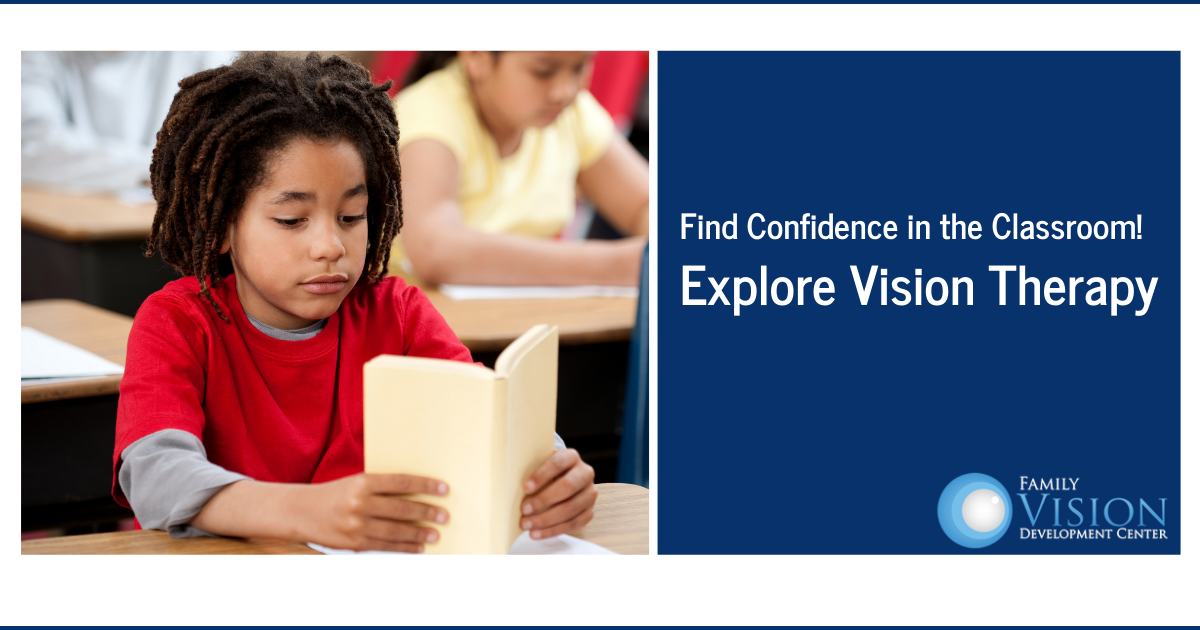A vision therapy program is an individualized type of physical therapy for the eyes and brain, and is used to develop, improve and/or enhance visual function through a series of eye exercises. The in-office programs may involve the use of specialized equipment such as corrective or therapeutic lenses, prism lenses, balance boards or visual-motor-sensory integration training devices. Additionally, patients may be given at-home exercises on a weekly basis in order to reinforce the progress made in the office.
A vision therapy program can be extremely successful in treating a variety of visual disorders. Wondering if it’s the right choice for you? If you are experiencing any of the following issues, you should definitely explore the possibility.
School struggles
A vision disorder can cause a student to experience many challenges in school. For example, refractive vision problems can cause blurred vision so a child would have difficulty reading or seeing the front of the classroom. A functional vision problem may cause a child to experience double vision, transposing letters, confusing similar words or difficulty with reading, spelling and math. Finally, a child with poor visual perception may have 20/20 vision, but might have trouble distinguishing between two similar letters (such as u and n), putting a puzzle together or memorization, or may skip words or lines when reading. A vision therapy program can address any or all of these vision problems to help a student improve their learning ability and academic performance.
Recent head injury
If you have recently experienced a blow to the head or violent jarring of the upper body, it may have resulted in a concussion. This type of injury can commonly occur as a result of a vehicle accident, sports injury or fall, and should be taken seriously. Concussions can have several potential effects on your vision, including eye focusing, tracking, eye teaming, depth perception issues or loss of peripheral vision. A post-concussive vision therapy program can greatly improve visual function following a head injury.
Underdeveloped athletic performance
Young sports athletes who want to earn a spot on the best team and play in the most games possible must have highly developed skills in certain areas to outperform those they are competing against. Skills such as eye-hand coordination, visual reaction time and tracking a moving object can all affect an athlete’s ability to excel. A specialized sports vision therapy program can help improve these skills, along with other important visual skills such as eye focusing, visual acuity, peripheral vision and depth perception.
Your eyes are not working as a team
Eyes should work together as a team for proper binocular vision. This means they move in the appropriate direction, are aligned properly, and focus correctly at different distances. When the two eyes do not function together appropriately, symptoms of a binocular vision disorder can become very evident. For example, one or both eyes might turn inward or outward, or you might lose the ability to move one or both eyes in one or more direction(s). Other signs of a binocular vision disorder could include blurry or double vision, eye strain, headaches, light sensitivity, reading difficulties or dizziness. A vision therapy program can be a very effective solution in rehabilitating these types of vision impairments in order to restore normal visual skills.
At Family Vision Development Center, vision therapy is our specialty. When you visit us for any of the above issues, we will provide you with a comprehensive neuro-optometric vision evaluation and will create an individualized vision therapy program using the most current and effective equipment and methods. Contact our office at 630-862-2020 to learn more or to schedule your appointment.
Family Vision Development Center is a full-service vision center offering innovative vision therapy services, post-concussive vision rehabilitation, comprehensive vision exams for eyeglasses and contact lenses, management of ocular diseases including glaucoma, diabetes, macular degeneration and cataracts, and a state-of-the-art optical center offering the latest designs in eyewear.

